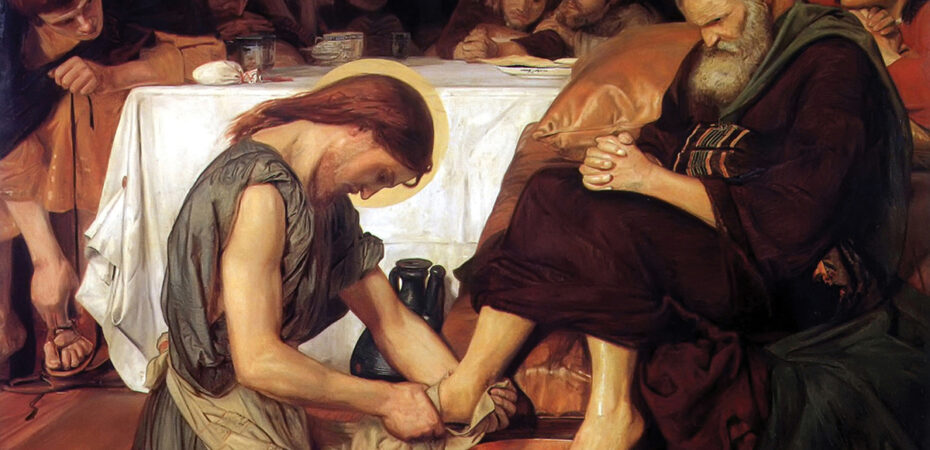Are There Limits to Forgiveness?
A reflection on Matthew 18:21-22
Father Eugene Hensell Comments Off on Are There Limits to Forgiveness?
The Bible avoids attempting to give a “dictionary” definition of forgiveness. Instead, it prefers to show us many and varied examples of forgiveness in action. Wherever we find it, forgiveness is the word used to describe the total wiping out of an offense by the one affronted. In the Bible, forgiveness is not simply the remission of penalties; it is the remission of sin. Key to any understanding of forgiveness is the fact that it can never be earned. Forgiveness is always a free gift, whether given by God or another human being.
The goal of this reflection is not to address the issue of forgiveness in general. Instead, we will direct our attention to one small passage from the Gospel of Matthew, which raises some interesting and challenging questions regarding forgiveness. Matthew 18:21 focuses on a one question Peter asks Jesus: “Lord, if my brother sins against me, how often must I forgive him?”
The Larger Context
We begin our reflection by putting Peter’s question into its larger context. Matthew’s Gospel is constructed around five major discourses: 1. the Sermon on the Mount (Mt 5:1—7:29); 2. the missionary discourse (10:1-42); 3. the parable discourse (13:1-52); 4. the discourse on life in the church (18:1-35); 5. the discourse on the future (24:1—25:46).
Peter’s question about forgiveness is located in the fourth discourse, which is concerned with life in the Church. A significant portion of that discourse is centered on the issue of how to deal with a brother or sister who sins against a community member (cf. 18:15-29).
Early Christian communities, such as the house churches to which Matthew is writing, were adamant about dealing with internal conflicts internally. Matthew offers a procedural guide in verses 15-17. It contains four steps. The first is to have the offender and the one offended talk the issue out and solve it through dialogue. Hopefully, this will resolve the difficulty. If not, the second step brings in two or more witnesses to verify the facts of the situation. Faced with the facts, it is hoped that the offender will concede and the issue be resolved. If facing the facts does not work, then a third step requires that the offender be brought before the entire community, which hopefully will be able to convince the offender that the issue is serious and that he or she must admit to wrongdoing. If coming before the whole Church does not work, then the fourth and final step stipulates that the person is to be shunned by the community like it would shun a gentile or a tax collector.
The Church hopes that a person shunned by the community will come to understand how important community life is and will repent and reconcile with the person offended and the entire Church. There is no question as to whether or not the Church has the power and authority to forgive sins. That was established in Matthew 16:19 when Peter was given the keys to the kingdom of heaven by Jesus himself. Many believe this power and authority is extended to the entire Church in 18:18. St. Augustine discussed this, which is reiterated in the Catechism of the Catholic Church (cf. No. 981).
In the Gospel, no sooner has the procedure been established for dealing with community members who offend or sin against other members than a serious question arises. The inquiry comes from no less a person than Peter himself. He knows the procedure for dealing with internal community conflicts. But what happens, Peter asks, if an offender goes through the process and appears to be reconciled but, in fact, sins again against a brother or sister? If an offender again sins against me and then asks for my forgiveness, to what extent or to what limit do I need to forgive this fellow community member?
Peter already has some ideas about this. He is aware that this situation is frequently the topic of conversation among the rabbis. They are mostly in agreement that the person being offended or sinned against needs to forgive the offender up to three times, but no more. However, Peter himself has proposed forgiving the offending sinner as many as seven times. In Peter’s mind, this proposal is far beyond what anyone would expect or require. Certainly, even Jesus himself would be extremely pleased with Peter’s great generosity.
Seventy-seven Times
Imagine how shocked Peter must have been by the response: “Jesus answered, ‘I say to you, not seven times but seventy-seven times’” (18:22). Scholars point out that the Greek word for seventy-seven corresponds exactly to the Septuagint version of Genesis 4:24. There might be an allusion here to the limitless vengeance about which Lamech is boasting: “If Cain is avenged seven times, / then Lamech seventy-seven times.”
Textual critics can argue over whether the number being referred to is “seven times seven” or “seventy times seven,” but the number is intended to be hyperbole. The point Jesus is making is that there can be no limits on the willingness to forgive. The unlimited revenge of primitive humans, as exemplified by Lamech, has given place to the unlimited forgiveness of Christians, but it does not carry with it unlimited opportunity to sin. Some see a possible tension here between the procedure for dealing with a community member who sins (cf. Mt 18:15-17) and Jesus’ mandate for unlimited forgiveness (cf. 18:21-22). One does not negate the other. We simply have to learn how to live with this kind of tension among biblical texts.
Forgiveness, like love, must be limitless. It is grounded in the very nature of God. Forgiveness cannot mean blindness and an indifference to sin. If God places no limits on forgiveness then humans cannot reverse that. Those who place limits on forgiveness will have limits placed on their forgiveness by God. The kind of forgiveness called for here is beyond all calculation. Whoever counts has not forgiven at all. We must keep in mind that Matthew is constructing this fourth discourse as he does all five of them. He takes material from the Jesus tradition and shapes it into a form that emphasizes an important point Matthew wants to make. Sometimes these traditional segments do not fit seamlessly, as we would prefer. Such is the case concerning the procedure for dealing with a community member who sins and Jesus’ emphasis on the requirement that forgiveness be unlimited.
An Unforgiving Servant
There is, however, a logic here that Matthew employs. He sets the stage with procedural guidelines for dealing with sinful community members. From here he moves even further with the emphasis that forgiveness for a Christian must be unlimited. This is the high point of Matthew’s teaching, which is based solidly on the teaching of Jesus himself. Finally, Matthew adds to this a parable about an unforgiving servant. This story is intended to illustrate in parabolic form the measureless mercy and forgiveness without boundaries required of all Christians (cf. 18:23-35).
A careful reading of the parable, however, reveals that it does not illustrate the necessity of repeated forgiveness as described in Matthew 18:21-22. Originally, this parable may have existed apart from the question Peter asks Jesus about forgiveness.

Matthew intends this parable about an unforgiving servant to illustrate the reality of the kingdom of heaven. He sets up the situation wherein a king decides to settle accounts with his servants. The story highlights a debtor who owes the king more than he could ever repay in several lifetimes. The king’s initial reaction to this debtor was to put him in prison. However, the debtor pleads with the king for mercy and the king gives it to him by canceling the debt. Now comes the twist in the parable. That same debtor who was forgiven an impossible debt has the opportunity to extend that grace to a fellow servant who owes him a small amount. But this servant refuses to forgive the fellow servant’s debt. When the king hears of this action on the part of the servant he had forgiven he reverses his decision and hands that servant over to be tortured. Matthew is most interested in the words Jesus speaks at the end of the parable. “So will my heavenly Father do to you, unless each of you forgives his brother from his heart” (v. 35).
The point here is that we cannot earn God’s forgiveness. However, we can lose it by trying to hoard it instead of passing it on to others.
Matthew’s Gospel was written around 1,938 years ago, give or take a few years. However, his insights and challenges concerning forgiveness are still relevant to our world. Everywhere we turn we are confronted with divisions, polarizations, systemic injustice and anger. That was the same reality Matthew faced as he put forth his teaching on forgiveness.
Keep in mind that the source he used for doing this was none other than Jesus himself. It is not an exaggeration to say that during his time on earth Jesus lived his life in a constant state of forgiveness. He instructed his disciples to do likewise. It is that teaching that has been captured in Matthew 18:15-35. Again, its high point comes with the question Peter asked Jesus regarding how many times must he forgive a fellow disciple who has sinned against him. Jesus’ shocking response was that forgiveness must be unlimited. That response continues to shock us even today.
Priesthood and Forgiveness
For a follower of Jesus, forgiveness involves willfully putting aside feelings of resentment toward someone who has sinned, been unfair or hurtful, or otherwise harmed one in some way. Keep in mind that forgiveness is not merely accepting what happened or ceasing to be angry. It involves a willful transformation of one’s feelings, attitudes and behavior so that one is no longer dominated by resentment and can even express compassion and generosity toward the person responsible for the wrong. It is this willful transformation that is at the heart of real forgiveness. This was always at the heart of Jesus’ forgiveness, and he urged his disciples to do likewise. Authentic forgiveness is a grace. It is a free gift that can never be earned.

Priests involved in pastoral ministry spend a good bit of time administering the Sacrament of Reconciliation. The heart of that sacrament is not the advice or encouragement that the priest offers to the penitent. The very heart of that sacrament is the words of forgiveness spoken by the priest over the penitent. Much of what we encountered in Matthew’s teaching on forgiveness is found condensed in the ritual formula of absolution:
“God the Father of mercies, through the death and resurrection of his Son has reconciled the world to himself and poured out the Holy Spirit for the forgiveness of sins; through the ministry of the Church may God grant you pardon and peace. And I absolve you from your sins, in the name of the Father, and of the Son, and of the Holy Spirit, Amen.”
Many times, we get discouraged by the fact that we do not seem to make much progress in our spiritual lives. This is evidenced by our experience of repeating the same things time and again during the Sacrament of Reconciliation. Doesn’t God get tired of hearing the same list over and over? Matthew’s Gospel says, in effect, “No, God does not get tired of us saying the same things over and over” (cf. 18:15-35). Remember, forgiveness is not limited to three times or seven times, but seventy-seven times, which is Jesus’ way of saying that forgiveness is unlimited.
FATHER EUGENE HENSELL, OSB, is a monk of St. Meinrad Archabbey in St. Meinrad, Indiana, and an associate professor of Scripture at St. Meinrad Seminary and School of Theology.
…………………………………………………………………………………………………………………………………………..
Confession and the Gift of Forgiveness
The U.S. bishops’ pastoral exhortation “God’s Gift of Forgiveness,” on the Sacrament of Penance and Reconciliation, notes that in confession “we meet the Lord, who wants to grant forgiveness and the grace to live a renewed life in him. In this sacrament, he prepares us to receive him free from serious sin, with a lively faith, earnest hope and sacrificial love in the Eucharist.”
The Church requires that every Catholic go at least once a year. The exhortation encourages us of the potential gifts received in the sacrament: “By the grace of the Holy Spirit, we seek forgiveness and repentance, let go of patterns of sin, grow in the life of virtue, and witness to a joyful conversion.”
Pope Benedict XVI has said, ‘The New Evangelization … begins in the confessional!’”
……………………………………………………………………………………………………………………………………………





